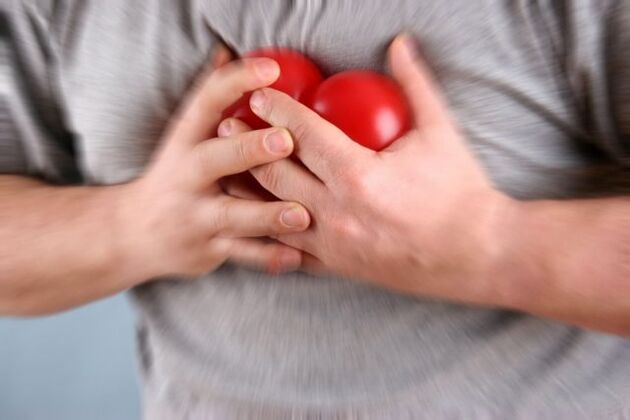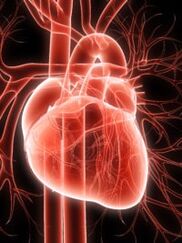Hypertonic disease is one of the most common pathologies in the cardiac area, in which every third inhabitant of our planet is diagnosed at the age of 45. In recent years, the disease has become much younger and now often to the number of high blood pressure patients that they can see very young people with high pressure. The main danger of the pathological state lies in his complications. GB can lead to heart attack and stroke that reduce the aneurysm of the main vessels, provoke the development of a rough kidney function and a strong deterioration in visual quality.
Human blood pressure has an upper, heart rate or systolic value as well as diastolic pressure or its lower renal level. According to WHO standards, the standard of these indicators should not be more than 139/89 mm Hg. Art. , Otherwise it is common to talk about high blood pressure. Early diagnosis and timely treatment of high blood pressure - the chance of a person to prevent the occurrence of pathological changes through many internal organs that maintain health and enjoy a full life for many years.
Reasons
Unfortunately, modern medicine was not yet able to completely solve all the likely causes of high blood pressure, but most of them are known for doctors. In order to determine which factor led to the development of the disease, only an experienced specialist who not only uses his knowledge in the diagnostic process, but also the results of numerous studies that confirm or refute the presence of signs of high blood pressure in one person.
The main reason for the growth of blood pressure is a violation of the activity of the sympathetic adrenaline system of a person, ie the constant irritation of the center, which is responsible for the narrowing of the vessels in the brain.
This can be done under the influence of numerous exos and endogenous factors that contribute to a sudden cramps of blood vessels.
Symptoms of high blood pressure can occur in people with exogenous factors placed in this way to develop a pathological state:
- Frequent loads and heavy nervous tensions;
- improper nutrition;
- sitting lifestyle;
- Irregular working day, work on a night shift;
- Regular consumption in large amounts of strong alcohol and smoking;
- Drugs;
- Intensive care.
Under the endogenous factors, age and poor inheritance come to the fore when the disease can move from parents to a child. The development of high blood pressure also applies:
- Vascular lesions atherosclerosis;
- Obesity;
- In particular, metabolic diseases, diabetes mellitus, hyperthyroidism;
- Kidney diseases;
- increased calcium and sodium levels in the blood;
- Hormonal changes that are the most common cause of high pressure in women during pregnancy and menopause.
classification
There is currently more than a classification of high blood pressure. The disease usually differs from the type of course, the presence of complications, the reasons for the development, pressure indicators and much more.
Modern cardiologists distinguish several hydration (depending on the indicators of high pressure):
- 1 degree print increases to 159-140/99-90 mm ed. Art. ;
- 2 degrees The arrows of a mechanical tonometer, an indicator 179-160/109-100 mm RT is diagnosed. Art. ;
- 3 degrees - persistent or periodic pressure increase of more than 180/110 mm ed. Art.
After the generally recognized classification of WHO, there are such stages of the disease:
- 1. Level of transient pressure increase without damage to the target organs;
- 2 stages - the presence of signs of damage to internal organs, under which the main goal is the heart, blood vessels, eye structures, brain and kidney;
- Level 3 - A stable increase in blood pressure against the background of the development of complications, from whose manifestations whose person can die.
Hypertensive diseases have their own types of currents, including:
- A benign type or a sluggish GB variant if the symptoms of the pathology have been developing very slowly for ten years and the risk of complications is minimally evaluated.
- A malignant disease in which strong print jump, lesions of target organs and frequent hypertonic crises are recorded (this version of the disease is difficult to borrow into medication).
Symptoms
The disease in the early stages of its development is almost asymptomatic, which complicates its early detection. In such patients, increased pressure can be exposed to a physical examination or during the usual admission in the clinic.

A more complex type of high blood pressure characterizes a number of characteristics that considerably worsen the quality of life of a person and are the reason for his attraction to specialists. The main symptom of the disease is an increase in blood pressure over 140/90 mm ed. This disease provokes the development of headaches that are the result of a narrowing of the vessels of the brain. As a rule, people who are susceptible to high blood pressure complain about the occurrence of pain in the neck and temples that are pulsating, which differs from their severe and sudden development. Such pain and pulsation do not go after taking analgesics.
Hypertension often feels solo swindling, which can occur after the execution of easier work. The symptom is often accompanied by nausea and vomiting as well as general malaise due to an increase in intracranial pressure. The narrowing of the vessels of the hearing aid leads to noise in the ears when it seems to someone that his ears are very laid, and he practically loses his ability to perceive the sounds of the environment.
The violation of the coronary blood flow leads to the development of myocardiacalemia. Such patients have shortness of breath and rag pain that are well suited for correction with nitrates. At that time, the organ works in an improved mode to push the blood stack into narrowed suitcase ships. Every attack by angina pectoris accompanies a quick pulse, a pronounced heartbeat and risk that such an impressive complication of a pathological state occurs as a myocardial infarction.
In the event of high blood pressure, the eyes of the eyes are determined with a sharp deterioration in vision and the development of hypertension angiopathy of the vessels of the retina. The floor is also involved in the pathological process that swells and presses the visual nerve. At that time, a person introduces the "goosebumps" in front of his eyes, dark circles and ding.
A complication of the symptoms of high pressure in women occurs most often in menopause during menopause. During this time, hormonal restructuring occurs in the body of the representative of the weaker gender with violation of the production of biologically active substances that control the normal pressure level. Therefore, high blood pressure is the most common consequence of menopause in women.
Complications
GB refers to the number of insidious diseases that are slowly progressing and very often diagnosed in the stage of the first complications of the pathological process. With a constant increase in blood pressure in the target organs, dystrophic and sclerotic changes are carried out, which leads to gross functional disorders. First of all, kidney, brain, heart, visual analyzer and blood vessels suffer from arterial hypertension.

There are several risk factors that influence the development of complications with high blood pressure and the degree of their severity:
- Bad habits, especially smoking;
- a sitting lifestyle and an increased body mass index;
- Increased cholesterol level in blood and hyperglycemia;
- Frequent loads;
- a potassium and magnesium deficiency in the body;
- Age -related changes;
- Hereditary disposition.
In the event of a hypertensive disease, the heart must work under high stress conditions, which is associated with the need to push blood into narrowed vessels. Over time, the myocardial wall thickens and in one person there is a hypertrophy of the left ventricle and the oxygen hunger of the heart muscle.
Different types of high blood pressure are differentiated from the side of the heart:
- Ischemic disease;
- Angina Pectoris;
- Atherosclerosis of the coronary vessels;
- Acute form of heart failure in the form of a myocardial infarction;
- Chronic heart failure.
A high degree of blood pressure causes the appearance of brain disorders in one person, which manifests itself in the practice of severe dizziness, headache, ears, memory reduction and more. There are various options for complex brain complications of high blood pressure:
- Encephalopathy with vestibular disorders;
- Ischemic and hemorrhagic stroke;
- Cognitive diseases of brain activity.
As you know, the kidneys check the amount of water and salt in the body. But with an increase in blood pressure, you can fully do your main work. This contributes to the development of a series of complications, including:
- Kidney failure;
- Violation of the function of filtering and release of liquid;
- Nephrosclerosis.
Such disorders lead to the development of a series of symptoms in high blood pressure that indicate a pathology of the kidneys. A sick person begins to complain about general weakness, malaise, origin and inappropriate nausea.
The defeat of the eyes manifests itself by the occurrence of bleeding in the retina, the edema of the optical disc and a progressive visual loss. On the part of the peripheral vessels with arterial hypertension, the most impressive complication is the stratification of its wall, in particular the well -known aortic aneurysm, which is formed and drives asymptomatic, which often leads to a sudden fatal result.
Diagnosis
The diagnosis of GB with the establishment of the stage and the degree of development of the disease is an important step towards the appointment of adequate treatment of the pathological state. For this reason, you should contact a medical facility immediately to determine the causes of increased pressure and methods of your correction if the first signs indicate that a hypertensive illness indicates.

A complex of diagnostic measures in the event of suspected high blood pressure includes a number of laboratory and instrumental studies, including:
- Laboratory blood test with which you can determine the level of potassium and magnesium, creatinine, harmful cholesterol, glucose and the like;
- Biochemical examination of urine with the determination of the amount of protein;
- Electrocardiography (EKG);
- Ultrasound examination of the heart;
- Doppler -Flosse;
- Inspection of the eye floor.
The diagnostic procedure for high blood pressure, with which the degree of disorders can determine, consists of two stages:
- The first stage is the determination of the clinical manifestations of the disease from the words of high blood pressure and the achievement of the results of additional studies;
- The second stage is a special study with which you can determine the exact degree of illness and the presence of his complications in the patient using a magnetic resonance therapy (MRI) or the X -ray examination.
The daily monitoring of blood pressure enables the exact image of the course of the disease. Thanks to this, you can define the pressure fluctuations all day long and determine the average indicator that characterizes the degree of high blood pressure. The main disadvantage of such a study is their high costs.
Treatment
The treatment of high blood pressure injuries should occur in a cardiological hospital in which there is the possibility of constant control over the level of blood pressure. In addition, the doctor can change the patient's therapy plan if necessary and prescribe effective medication in any specific clinical case.
They begin to treat the disease with the appointment of a special diet that strictly restrict the table salt, fat and roasted dishes as well as the overwhelming, smoked meat and flour products. The hypertensive nutrition aims to improve the general state, to prevent the development of edema, normalize the weight and the like.
According to the new European recommendations, the treatment of GB must be comprehensive and contain a number of medicinal products, the effect of which reduces blood pressure and eliminate the risks of converting the disease into a malignant version of its course or the development of complications of the pathological state. A distinction should be made between high blood pressure among the most frequently used drug groups:
- Alpha blocker;
- Gangloblocators;
- ACE inhibitors;
- Beta blocker;
- Calcium channel blocker;
- Diuretics.
The doctor pays particular attention to the appointment of diuretics. The fact is that not every diuretics due to its properties for washing potassium for the body is safe for the body. For this reason, the use of such medicines should be combined with the use of potassium preparations under the control of the biochemical composition of blood. In addition, diuretics not only reduce the pressure, but also the tissue edema by excretion excess sodium.
It is strictly forbidden to treat high blood pressure independently.
It is also not recommended to use blood -like medication in traditional medicine without coordinating this use with the applicable doctor. Forbidden measures as the main contrasting can provoke an urgent hypertensive crisis and the need for the patient's immediate space in a special hospital in order to clarify the causes of complications and to solve the problem of further tactics of their removal.

prevention
To prevent hypertension, it is necessary to subject a number of measures that aim at the timely detection and elimination of the risks of the development of a pathological state and the stabilization of already increased pressure. In order to prevent the occurrence of the first signs of the disease, a person should normalize their lifestyle, give up bad habits and salt consumption, increase their physical activity and also lose weight. Special attention should be paid to potential patients in whom the risk of high blood pressure is hereditary. This category of people should always be able to measure the pressure with which you can monitor your condition.
The occurrence of disorders caused by blood pressure can be warned if:
- lead an active lifestyle (medical physical education, fitness, massage, fresh air hikes, skiing, swimming in the pool) and regularly train in the gym;
- Give up harmful food, smoke and don't drink alcohol;
- Reduce salt use to 3-4 g a day;
- is forbidden to eat food with a high content of animal fats, preservatives, cholesterol levels.
- Watch a clear daily routine and practice full sleep.
- prevent the appearance of excess fat deposits that cause obesity;
- Prevent stressful situations;
- regularly subjected to a preventive examination by a cardiologist and put the necessary tests;
- If the first signs of increasing pressure occur, they are immediately looking for medical help.
People who inherited the tendency towards high blood pressure should be aware of their health, exercise and examine it regularly. GB's finished diagnosis implies the observation of patients in the pharmacy of patients and, if necessary, send them to the Commission to determine a disability.















